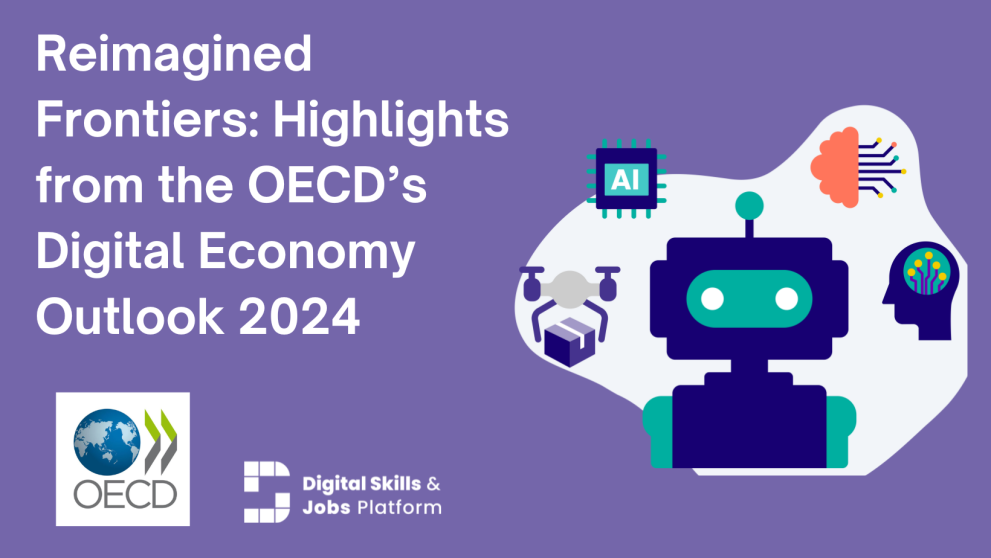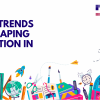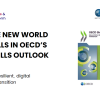Embracing the Tech Frontier: our main takeaways from the OECD's 2024 Digital Economy Outlook

Each year, the OECD (Organisation for Economic Cooperation and Development) publishes its Digital Economy Outlook (DEO). The 2024 edition is split in 2 volumes, with Volume 1 published on 14 May. Goal of the report? To highlight the trends that have driven and will undoubtedly drive further forward, the future of digital economy in Europe and the world.
We summarised the main bits of the report, and added some of our analysis below. Take a look, take a glance, and head over to the OECD's full report for more information.
2024 Digital Outlook edition: at a glance
Amongst all themes the OECD's report unpacks, Artificial Intelligence (AI) emerges as a main cross-cutting element upon which impact on the digital economy ultimately rests. This is hardly news: AI has become a buzzword not just in recent years, but with ChatGPT, it's now been creating buzzwords of its own. Other technologies highlighted by the report as specifically influential on the digital economy are virtual worlds and immersive technologies, as well as next generation wireless networks.
The 2024 DEO edition looks at the way people, firms, governments and social partners from all over Europe and the world, are adopting digital technologies, and how this impacts society, businesses, and the economy. It also offers new estimates of growth that go alongside additional research on bridging the skills gap, boosting equality and promoting inclusion.
Mental health is also in the spotlight. a key part of the 2024 DEO is reserved to what happens in our brains in the context of the digital environment - and how this impacts the way we think, live, and work.
Dynamic growth in ICT sector
Growth in the ICT sector has outpaced growth in other economic sectors - by a lot. Take a look at the graph below to see how the ICT sector has grown compared to the rest.

When we talk about the digital economy, we do not mean just the information and communication technology (ICT) sector anymore. Digitalisation is present in almost all jobs today, and this is bound to increase further. However, the ICT sector remains at the core of the digital economy, as the main avenue to boost innovation and enhance overall competitiveness.
At the same time, differences from one country to the next remain.
"In many OECD countries, 2023 was a record year for ICT sector growth. Ten countries had growth rates above 9%: Austria, Belgium, Canada, Denmark, Finland, Germany, the Netherlands, Switzerland, the United Kingdom and the United States. In Belgium and the United Kingdom, ICT sector growth exceeded 11%. Increased demand for ICT products and services following COVID-19 may partially explain the strong performance in 2023".
AI: a game-changer in a fully transformed game
The 2024 DEO edition breaks the stereotype of AI as a gamechanger, and puts forward the thesis that AI is changing faster than impact can be measured. Still, attempts have been made. See how AI is impacting the way we process information, and the very information that is presented. Then have a look at language divides opened up by AI.

"Stop the Internet, I want to leave!" - mental health in the spotlight
A growing concern highlighted in the report is the association between negative behaviours in digital environments and how they impact mental health. Demographic groups experience the internet differently, and the DEO 2024 suggests the impact on girls' mental health seems to be higher compared to boys' one and this is especially the case if we look at cyberbullying. In more than half of countries analysed, girls experienced higher levels of cyberbullying compared to boys. Boiling down the picture to Europe, differences from one country to the next prevail - the gap in Norway was just under 1%. The one in France - over 6%.
As young people spend an increasing amount of time online and digital environments become more immersive and 'real', risks for society have to be mitigated. Groups that may be disproportionally affected by negative behaviours in digital environments, such as girls, should be supported. As this is an emerging area, governments may lack formal initiatives to prevent and address mental health problems in the digital age. The report highlights that the EU is leading in this sphere, with a range of initiatives like Safer Internet Day and Better Internet for Kids, succeeding in making a safer environment for youngsters in an increasingly digital and interconnected world.
Did we spark your interest?
OECD has more. Dive into the full report below and play with the data yourself.





